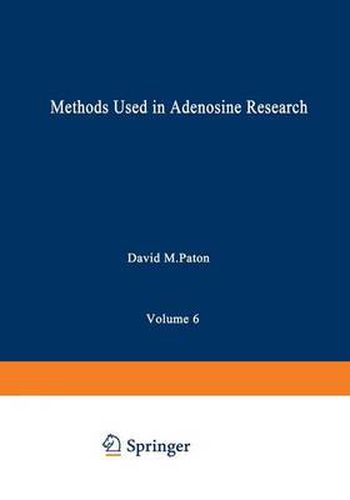Readings Newsletter
Become a Readings Member to make your shopping experience even easier.
Sign in or sign up for free!
You’re not far away from qualifying for FREE standard shipping within Australia
You’ve qualified for FREE standard shipping within Australia
The cart is loading…






This title is printed to order. This book may have been self-published. If so, we cannot guarantee the quality of the content. In the main most books will have gone through the editing process however some may not. We therefore suggest that you be aware of this before ordering this book. If in doubt check either the author or publisher’s details as we are unable to accept any returns unless they are faulty. Please contact us if you have any questions.
In their classic paper in 1929, Drury and Szent-Gyorgyi described a number of the important cardiovascular actions of adenosine. Another thirty years were to pass before the possible physiological role of adenosine in coronary vasodilation was studied by Berne and others. Since then, there has been a tremendous increase in research into the actions of adenosine. Workers from many disciplines have employed a wide variety of techniques, since adenosine is a product of and a substrate for a number of metabolic pathways, is transported into cells, and acts at discrete receptor sites to modulate the activity of adenylate cyclase and to produce important actions on many cells and tissues including platelets, adipo cytes, heart, blood vessels, and other smooth muscles. International symposia on the actions of adenosine were held in 1978, 1981, and 1982, and the proceedings of these symposia have been published (Baer and Drummond, 1979; Daly et at., 1983; Berne et at., 1983). Since it is not the primary purpose of the present volume to review our current understanding of the nu merous actions of adenosine, these volumes should be consulted for such details. Rather, the present volume has been planned to provide both graduate students and investigators in pharmacology and related disciplines with a summary of some of the methods now available for the study of the actions of adenosine and, in particular, to highlight their possible uses and limitations.
$9.00 standard shipping within Australia
FREE standard shipping within Australia for orders over $100.00
Express & International shipping calculated at checkout
This title is printed to order. This book may have been self-published. If so, we cannot guarantee the quality of the content. In the main most books will have gone through the editing process however some may not. We therefore suggest that you be aware of this before ordering this book. If in doubt check either the author or publisher’s details as we are unable to accept any returns unless they are faulty. Please contact us if you have any questions.
In their classic paper in 1929, Drury and Szent-Gyorgyi described a number of the important cardiovascular actions of adenosine. Another thirty years were to pass before the possible physiological role of adenosine in coronary vasodilation was studied by Berne and others. Since then, there has been a tremendous increase in research into the actions of adenosine. Workers from many disciplines have employed a wide variety of techniques, since adenosine is a product of and a substrate for a number of metabolic pathways, is transported into cells, and acts at discrete receptor sites to modulate the activity of adenylate cyclase and to produce important actions on many cells and tissues including platelets, adipo cytes, heart, blood vessels, and other smooth muscles. International symposia on the actions of adenosine were held in 1978, 1981, and 1982, and the proceedings of these symposia have been published (Baer and Drummond, 1979; Daly et at., 1983; Berne et at., 1983). Since it is not the primary purpose of the present volume to review our current understanding of the nu merous actions of adenosine, these volumes should be consulted for such details. Rather, the present volume has been planned to provide both graduate students and investigators in pharmacology and related disciplines with a summary of some of the methods now available for the study of the actions of adenosine and, in particular, to highlight their possible uses and limitations.